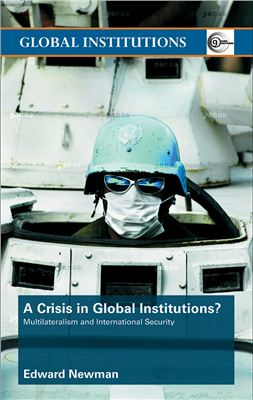Routledge, 2007. 184 p.
The legitimacy of global institutions which address security challenges is in question. The manner in which they make decisions and the interests they reflect often fall short of twenty-first century expectations and norms of good goveance. In addition, their performance has raised doubts about their ability to address contemporary challenges such as civil wars, weapons of mass destruction, terrorism, and the use of military force in inteational politics.
This book explores the sources of this challenge to multilateralism – including US preeminence, the changing nature of inteational security, and normative conces about the way decisions are taken in inteational organizations. It argues that whilst some such challenges are a sign of ‘‘crisis, ’’ many others are representative of ‘‘normality’’ and continuity in inteational relations. Nevertheless, it is essential to consider how multilateralism might be more viably constituted to cope with contemporary and future demands.
Addressing topical issues, such as the war against Iraq in 2003 and terrorism, and presenting provocative arguments, this dynamic book will have broad appeal amongst specialist readers interested in inteational relations, security and inteational organizations, as well as students generally.
Multilateral malaise – sources and manifestations.
The United States, power, and multilateralism.
Collective security and the use of force.
Humanitarian intervention.
Weapons of mass destruction.
Civil war, state failure and peacebuilding.
Terrorism.
Conclusion: revisiting institutionalism in a post-Westphalian world.
The legitimacy of global institutions which address security challenges is in question. The manner in which they make decisions and the interests they reflect often fall short of twenty-first century expectations and norms of good goveance. In addition, their performance has raised doubts about their ability to address contemporary challenges such as civil wars, weapons of mass destruction, terrorism, and the use of military force in inteational politics.
This book explores the sources of this challenge to multilateralism – including US preeminence, the changing nature of inteational security, and normative conces about the way decisions are taken in inteational organizations. It argues that whilst some such challenges are a sign of ‘‘crisis, ’’ many others are representative of ‘‘normality’’ and continuity in inteational relations. Nevertheless, it is essential to consider how multilateralism might be more viably constituted to cope with contemporary and future demands.
Addressing topical issues, such as the war against Iraq in 2003 and terrorism, and presenting provocative arguments, this dynamic book will have broad appeal amongst specialist readers interested in inteational relations, security and inteational organizations, as well as students generally.
Multilateral malaise – sources and manifestations.
The United States, power, and multilateralism.
Collective security and the use of force.
Humanitarian intervention.
Weapons of mass destruction.
Civil war, state failure and peacebuilding.
Terrorism.
Conclusion: revisiting institutionalism in a post-Westphalian world.

